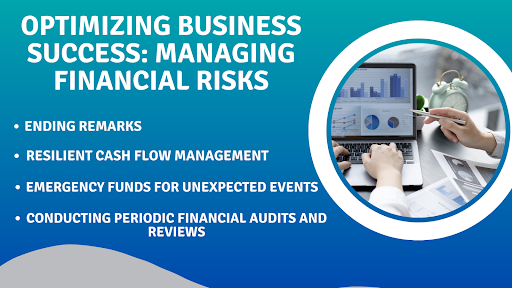Welcome, small-business owners and entrepreneurs! As the business world is always changing, it’s important to learn how to manage financial risk to make sure your business does well. Having seen a lot of businesses grow and fail, we understand how hard it is for you to find your way in an uncertain world.
In this article, we are excited to share expert tips from Direct Funding Now that will help you take control of your financial risks and protect the long-term health of your business. So fasten your seatbelts and get ready to start a trip that will help you become more financially stable. Without further ado, let’s get to the good ideas that are coming up!
Resilient Cash Flow Management
Small businesses can’t compete with industry giants if they can’t manage their cash flow well. This is not only important for their day-to-day operations, but also for their ability to do so. However, by using strong cash flow management strategies, small businesses can keep their finances stable, take advantage of growth opportunities, and do well in a very competitive market. Now, let’s look at some useful tips from Direct Funding Now that can help businesses manage their cash flow well.
- Forecasting and planning: Make a detailed cash flow forecast that predicts cash inflows and outflows over a certain time period. Think about more than one possible outcome to account for changes and surprises.
- Streamlining Invoicing and Payments: Use efficient invoicing methods to make sure bills are sent out on time and minimize payment delays. Follow up regularly on payments that are late and think about ways to encourage early payments.
- Controlling expenses: Look over your expenses regularly to find ways to save money. Use measures to cut costs that don’t lower the quality of products or services.
- Managing Inventory: Make sure you have the right amount of stock on hand to keep costs down and avoid having too much or old stock. Use data analytics to predict demand and streamline the way you order stock.
- Making connections: Build strong relationships with customers to get them to come back and pay on time. Work closely with suppliers to negotiate good payment terms and make long-term partnerships.
- Emergency Funds: Set up and keep up an emergency fund to use as a safety net in times of trouble or when things don’t go as planned. Regularly put money into the fund and don’t use it for things that aren’t necessary.
Emergency Funds for Unexpected Events
Building and keeping an emergency fund is a key part of small businesses’ financial risk management. A savings account for emergencies is like a safety net in case something bad comes up. It gives you a buffer to get through tough times without putting the business’s future at risk. Let’s talk about why emergency funds are important:
- Financial Resilience: Unexpected events like natural disasters, economic downturns, or industry disruptions can have a big impact on a small business’s income and operations. An emergency fund gives you the financial cushion you need to weather these storms and keep running smoothly.
- Business Continuity: Having an emergency fund lets small businesses pay for things like payroll, rent, utilities, or inventory, even if their income drops or stops for a while, in times of crisis or the unexpected. This makes sure that the business keeps going and stops problems that could cause long-term damage.
- Reducing debt and dependence: If a small business doesn’t have an emergency fund, it might have to rely on high-interest loans or credit cards to pay for unexpected costs.
Conducting Periodic Financial Audits and Reviews
These thorough reviews of financial records, statements, and processes tell a lot about the business’s financial health, efficiency, and compliance.
By doing regular audits and reviews, small businesses can find areas to improve, reduce risks, and make smart strategic decisions. Let’s look at the most important steps for doing financial audits and reviews on a regular basis, according to Direct Funding Now:
- Firstly, find the most important things that need to be audited, such as financial statements, accounts, internal controls, and compliance. Also, make an audit plan with timelines, resources, and roles.
- Thirdly, identify potential risks, such as fraud, mistakes, or not following the rules. Assess the impact and likelihood of each risk to decide how to order audit procedures.
- Fourthly, do real things to see if financial records are correct and full. Samples should be analyzed and data analysis should be done to find outliers or strange patterns.
- Moreover, write down the results of the audit, including any discrepancies, mistakes, or areas that need improvement. Keep a well-organized audit trail for future reference and for documentation.
- Furthermore, write a full report that summarizes the audit’s findings and suggestions. Give the audit report to the right people, such as management, board members, or regulatory bodies.
- Finally, check how well recommendations are working on a regular basis. Changes in business needs and regulations mean that audit procedures and plans need to be kept up to date.
Ending Remarks
Ultimately, effective financial risk management empowers small businesses to not only function effectively but also compete with industry giants. By Implementing these practices outlines by Direct Funding Now, small businesses can position themselves for sustainable growth, navigate uncertain times, and secure a prosperous future.





